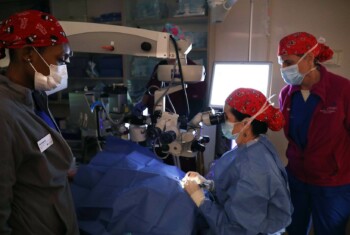Parvo in puppies is a common disease with deadly consequences. This is why it’s so important for owners of young dogs to be fully aware of what parvo is, what the symptoms are and how to avoid it.
What is parvo?
The canine parvovirus causes parvo in puppies. The virus is very contagious and spreads through direct contact with an infected dog or by indirect contact with a contaminated object. Infected feces from another dog will expose your dog to the virus if your dog consumes, licks or even sniffs the feces. A person who has recently been exposed to an infected dog could also indirectly infect your puppy, which would be a form of indirect contact. Another form of indirect contact could come from your puppy encountering a contaminated object such as a food or water bowl, leash, collar or even the hands and clothing of people who handle infected dogs.
Once infected, parvo is classified by the Merck Veterinary Manual as a disease of the stomach and small intestines, which is where the virus does the most damage. The virus prefers to infect the small intestine, where it disrupts the gut barrier, impairs absorption and destroys cells. Parvo in puppies can also affect the bone marrow and lymphopoietic tissues, which play a vital role in a dog’s immune system, and in some cases affect the heart.
BluePearl hospitals saw a dramatic increase in parvo cases during the COVID pandemic, highlighting how dangerous this disease can be for young, unvaccinated dogs.
Symptoms of parvo in puppies.
Puppies infected with parvo are very sick. The sooner you are able to catch the early signs of the virus in puppies, the sooner you can get your dog to the vet. Because parvo is very common in young puppies, you should always call the vet anytime your puppy is feeling under the weather, but be mindful of these specific symptoms of parvo in puppies:
- Bloody diarrhea
- Vomiting
- Fever
- Lethargy
- Anorexia
- Weight loss
- Weakness
- Dehydration
- Depression
Any of these symptoms should be considered serious and you should notify an emergency veterinarian immediately if your regular vet isn’t available. In the event that you suspect your puppy has parvo, be sure to notify the hospital ahead of time of your suspicions and the puppy’s symptoms so they can take the appropriate precaution to quarantine and prevent further infection of other dogs.
Parvo recovery.
Parvo can be a fatal disease. The survival rate of dogs treated by a veterinarian for parvo is between 68 and 92%, and most puppies that survive the first three or five days make a complete recovery. Depending on the severity of the case, with proper care and early treatment, the recovery time should be around one week or so.
In the event you or someone you know thinks their puppy may have signs of parvo, reach out to your primary care vet or a local emergency veterinarian.
Most BluePearl emergency pet hospitals are open 24/7 and during holidays. Find your nearest BluePearl here.


